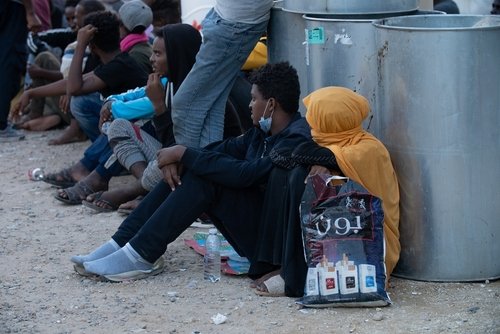Belgium, (Brussels Morning Newspaper) Because of the recent EU Migration Pact, the detention of migrants is a hot issue right now. But what few people know: thousands of migrants are detained every year in the heart of Europe. Emmanuelle Vinois of the National Move Coalition: “Belgium‘s six detention centers are inefficient and harmful.”
Administrative detention of migrants is not new. For 35 years, since 1988, migrants can be detained in Belgium. There are six administrative detention centers, where 6,000 to 8,000 people are locked up each year.
Yet few Belgians will know the locations. The centers are hidden behind high walls and fences. Hardly anyone enters them; control is limited. There is no national prevention mechanism against torture in Belgium, as required by the United Nations. Journalists are not welcome in the centers. Parliamentarians and mayors do have access to the centers, but make little use of that privilege.
The detention centers are hidden from view, literally and figuratively. The Belgian system of administrative detention lacks transparency and control. But although the human and financial costs are high, there is no debate in Belgium about the sense of migration detention.
No judge, no end date
Only a limited number of accredited NGO visitors can enter detention centers. Visitors of the Move Coalition meet about 10 percent of the 6,000 to 8,000 detained migrants each year. These people talk about anxiety, feelings of depression, insomnia, self-harm,… The former detainees we continue to follow up with all testify to a lasting scar.
It’s logic. Belgium’s six detention centers are simply prisons. Shaped by high walls and barbed wire, communal regimes, and shared rooms (in Bruges up to 20 people). But there is one important difference: the people in the detention centers are not deprived of their freedom because they have committed criminal acts but for an administrative reason.
Before the migrants are locked up, there is no judge or lawyer involved. Only after his/her detention can a migrant seek legal representation. However, given the setting and location of detention, it is difficult for many people to find a (motivated) lawyer. Opportunities to appeal are short and rarely lead to releases.
Moreover, detention comes with no end date. Belgium has no maximum detention periods. Migrants live in total uncertainty. Detainees testify to our visitors about months of detention. At the time of this writing (end of June), one man has been detained for more than 13 months. More than a year. Let it sink in.
Asylum seekers and stateless persons
To nip the debate in the bud, Belgian politicians will communicate that “the detention centers are there for illegal criminals.” However, the group of detainees is much more diverse than the general public is led to believe. Our visitors see very different people and hear different stories.
They are people who are without legal residence for whatever reason. But also people who are simply not “removable” – think stateless or Afghan citizens. People who are still in procedure or covered by the Dublin Regulation are also deprived of their freedom. Not infrequently separated from their partner, children, and family.
It is barely known, but people seeking asylum at our airports are also systematically detained. Detention for these people is trauma on top of trauma. Moreover, from the closed environment, the asylum application is only made more difficult, partly because documentary evidence is difficult to collect.
100 million more?
It is argued that detention is only applied when it is “necessary” or “proportionate.” However, these terms are not legally based and remain deliberately vague. What is necessary about the detention of asylum seekers at the airport, of sans-papiers seeking to register at the municipality, of people who are not removable? What is proportional to months of hopeless detentions lasting more than a year?
The toll is high. Humanly, but also financially. Because each detained migrant costs the Belgian government – according to a recent parliamentary question – at least 237 euros per day. Between 2018 and 2022, Belgium spent a yearly average of 13 million euros on forced returns (not counting personnel costs). This while administrative detention by no means guarantees sustainable solutions. If we do not consider the direct returns at our airports, some 40 to 50 percent of detained migrants in 2021 … were released again.
Despite all this, the Belgian government recently announced that it will invest 100 million euros in additional detention centers in the coming years. The debate did not pick up. Unjustifiably so. Because administrative detention of migrants is harmful and inefficient. Also in Belgium.




